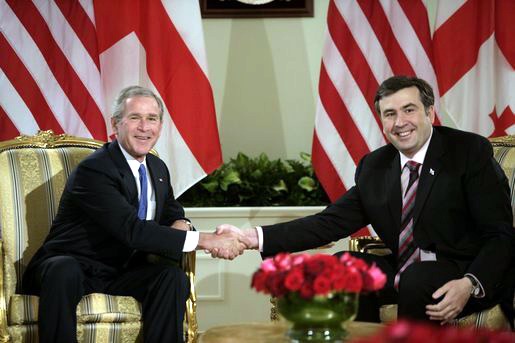Revolutionary Fervor Sweeps Georgia
First Ben Ali. Then Mubarak. Is Saakashvili next?
 Like other autocratic leaders trying to shore up their power, President Mikhael Saakashvili is facing a crucial test in the weeks ahead. As opposition leaders call for massive street demonstrations against his repressive regime, Saakashvili will have to decide whether to use force to crush the protestors à la Muammar Qaddafi or announce sweeping changes and concessions within his administration.
Like other autocratic leaders trying to shore up their power, President Mikhael Saakashvili is facing a crucial test in the weeks ahead. As opposition leaders call for massive street demonstrations against his repressive regime, Saakashvili will have to decide whether to use force to crush the protestors à la Muammar Qaddafi or announce sweeping changes and concessions within his administration.
Georgians no doubt feel emboldened by the Arab Spring and its demands for freedom. By trampling on human rights, jailing political prisoners, shutting down free media and ignoring charges of corruption and cronyism within his small circle, Saakashvili has behaved as if he knows better for his citizens than they do for themselves.
According to the U.S. Department of State’s 2010 Human Rights Report: Georgia, serious concerns remain about reported cases of prisoner abuse, arbitrary detentions and selective application of the law. The contrast is stark: crimes involving government officials or Saakashvili supporters were either investigated slowly or remain pending; crimes involving the opposition were dealt with swiftly. All this led “to allegations of impunity for government officials.”
The report identifies a lack of due process and frequent government pressure on the judiciary, stating that individuals remained in prison “for politically motivated reasons.” It also notes the widespread practice of pressuring businesses to “suppress potential support for the opposition and independent media” and “contribute to the ruling party.” Like the 2009 study, this one cites “credible reports that the government restricted freedom of speech and the press” and notes that “high-level corruption [remains] a concern.”
The main shortcomings described in the report are of particular concern to the United States “given our administration’s commitment to the engagement, support and protection of civil society and human rights defenders,” Ambassador John Bass said;
We also believe that stronger Georgian democracy requires the most competitive possible environment for the 2012 parliamentary and 2013 presidential elections. That’s why much of our assistance, including 60 million dollars in new investments this year, is focused on supporting electoral reform and strengthening the rule of law, independent media and civil society watchdogs.
Sixty million dollars of U.S. taxpayer money contributed to a country where the justice system is a nest of corruption. Since the Obama administration has cooled to the Georgian president, he has hired lobbyists in Washington to try and polish his tarnished image.
When Saakashvili and his dozen or so supporters stormed the parliament building in the fall of 2003, ending the rule of Edward Shevardnadze, Twitter did not exist. Facebook was a fledgling social site for college students and the Internet was just beginning.
The takeover—by surprisingly few people compared to the Arab uprisings—was touted in the Western media as The Rose Revolution, and the former Soviet republic was on its way to becoming a beacon of democracy in the region. But like other power-drunk leaders the United States has supported in takeovers, the Saakashvili they thought they knew turned out to be less palatable than Shevardnadze, who now lives under virtual house arrest in the capital city.
Saakashvili has built himself palaces, bought private planes, and treated himself to various perks while his people suffer from sky-high unemployment and abject poverty. Frustration among Georgians is fermenting as spring arrives in Tbilisi and the protestors demanding freedom and democracy gear up for weeks of street demonstrations. The world will be no doubt be watching.
